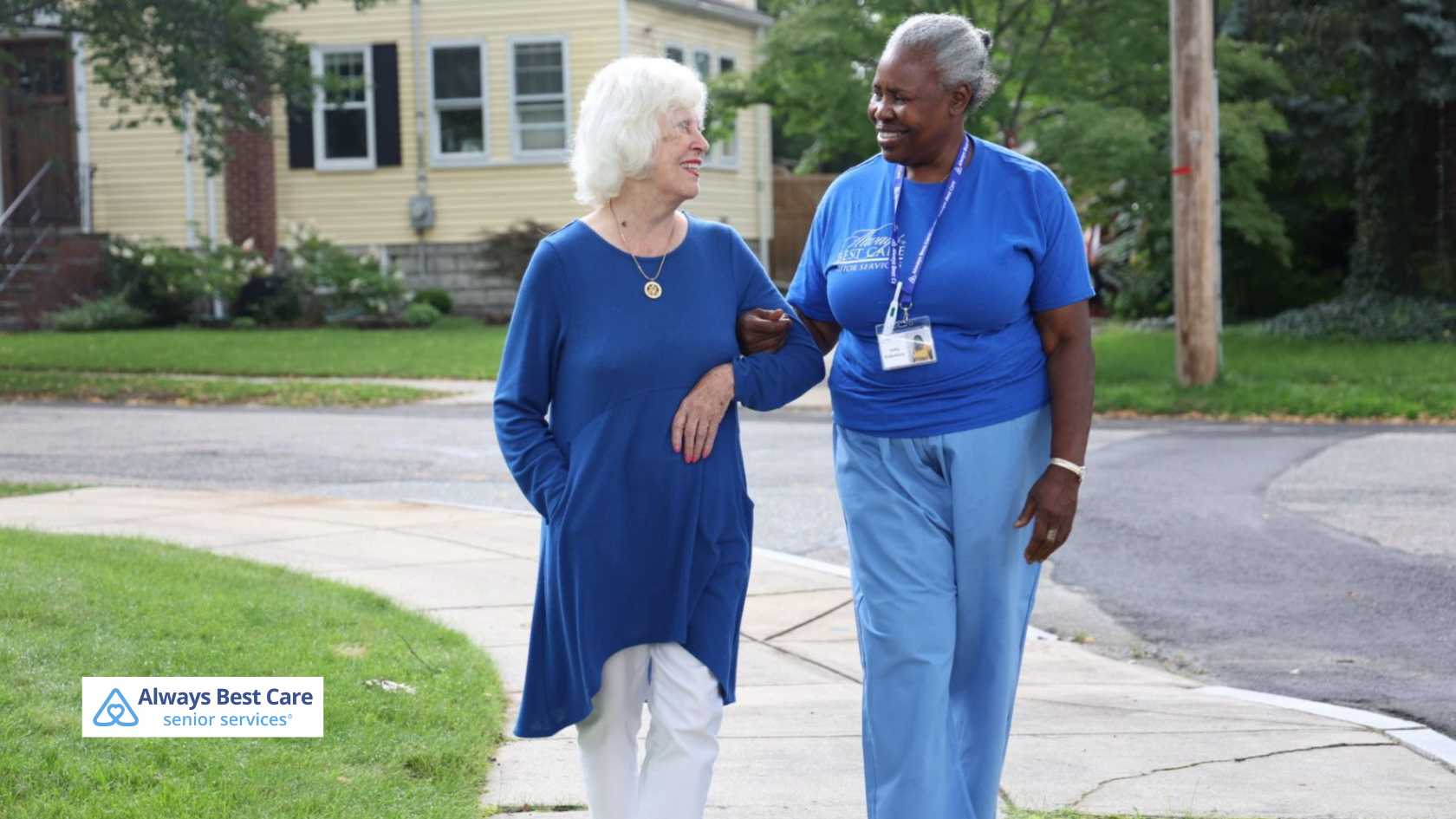5 Signs Your Loved One in Belmont May Need 24-Hour Care Services

As our loved ones age, their care needs often evolve. While it can be challenging to recognize when to consider 24-hour care services, it’s crucial for ensuring their safety and well-being.
Here are five key indicators that suggest it might be time to explore Always Best Care of Belmont’s 24-hour care options for your loved one.
Table of Contents
1. Changes in Physical Health
Physical health changes can significantly impact an individual’s ability to live independently. As we age, our bodies undergo various transformations that may necessitate additional support and care.
- Mobility Issues: Pay attention to how your loved one moves around their home. Are they experiencing frequent falls or near falls? Do they seem unsteady on their feet or hesitant to move without support? Decreased mobility can lead to a higher risk of accidents and injuries, requiring constant supervision.
- Chronic Health Management: Observe how well your loved one is managing their existing health conditions. Are they struggling to keep up with medication schedules? Do they seem overwhelmed by doctor’s appointments or health routines? Difficulty in managing chronic conditions could signal a need for more comprehensive care.
- Unexplained Weight Changes: Significant weight loss or gain can be a red flag. Weight loss might indicate problems with meal preparation, decreased appetite, or underlying health issues. Conversely, unexpected weight gain suggests a lack of physical activity or changes in eating habits that require attention.
- Increased Frailty: Notice if your loved one appears more fragile than before. Are they having trouble with tasks that require strength, such as opening jars or carrying groceries? Increased frailty can make daily activities challenging and potentially dangerous without assistance.
- Sleep Disturbances: Changes in sleep patterns, such as excessive daytime sleeping or difficulty sleeping at night, can impact overall health and daily functioning. These disturbances indicate underlying health issues or the need for a more structured daily routine.
- Sensory Impairments: Declining vision or hearing can significantly affect a person’s ability to navigate their environment safely. If you notice your loved one struggling to read, hear conversations, or respond to their surroundings, consider additional support.
2. Cognitive Impairment
Cognitive decline can pose serious risks for seniors living alone. Be alert to increased forgetfulness or confusion, difficulty with problem-solving or decision-making, getting lost in familiar places, forgetting to take medications, or taking incorrect doses. Cognitive impairment often necessitates round-the-clock care to prevent accidents and ensure proper daily functioning.
3. Difficulty With Daily Activities
When everyday tasks become challenging for your loved one, it’s a clear sign that additional support may be needed. Here are some key areas to observe:
- Personal Hygiene: Watch for signs that your loved one struggles with bathing, grooming, or dressing. This might include wearing the same clothes repeatedly, skipping showers, or neglecting oral care. Difficulties in these areas can impact both health and self-esteem.
- Meal Preparation and Nutrition: Pay attention to your loved one’s eating habits. Are they having trouble preparing meals or eating regularly? Check the refrigerator for expired food or a lack of fresh groceries. Poor nutrition can lead to health issues and decreased energy levels.
- Housekeeping and Laundry: Notice if the home is cluttered or household chores are neglected. Piles of dirty laundry, unwashed dishes, or general disorganization can indicate difficulties in managing daily tasks and may create unsafe living conditions.
- Financial Management: Look for signs that your loved one is struggling to manage their finances. This might include unpaid bills, confusion about financial matters, or difficulty handling routine transactions. Proper financial management is crucial for maintaining independence and security.
- Medication Management: Observe how well your loved one is managing their medications. Are pills being taken as prescribed? Are there expired medications or disorganized pill bottles? Proper medication management is essential for managing health conditions and preventing complications.
4. Social Isolation and Emotional Changes
Mental health is just as important as physical health for seniors. Here are key signs of social isolation and emotional changes to watch for in your loved one:
- Withdrawal from Social Activities: Notice if your loved one is declining invitations or avoiding social gatherings they once enjoyed. This could include skipping family events, refusing to see friends, or stopping participation in community activities.
- Loss of Interest in Hobbies: Pay attention if your loved one has lost interest in activities or hobbies they previously enjoyed. This might include giving up reading, gardening, or other pastimes that used to bring them joy.
- Increased Anxiety or Depression: Look for signs of persistent sadness, excessive worry, or a sense of hopelessness. These could manifest as changes in sleep patterns, loss of appetite, or expressions of worthlessness.
- Mood Swings or Personality Changes: Be aware of uncharacteristic irritability, sudden outbursts, or significant shifts in personality. These changes could indicate underlying emotional distress.
- Expressions of Loneliness: Listen for verbal cues where your loved one expresses isolation or loneliness. They might mention feeling forgotten or disconnected from others.
- Changes in Communication Patterns: Notice if your loved one makes fewer phone calls, sends fewer messages, or shows less interest in staying connected with family and friends.
5. Unkempt Living Environment
The state of your loved one’s home can indicate their ability to manage independently. An unkempt living environment may suggest that your loved one struggles to maintain their home and could benefit from constant care. Here are key areas to observe:
- Unusual Clutter or Disorganization: Take note if the home has become excessively cluttered or disorganized. This might include items left in inappropriate places, rooms that are difficult to navigate due to clutter, or a general sense of chaos in the living space.
- Neglected Home Maintenance: Look for signs that routine home maintenance tasks are overlooked. These could include overgrown lawns, minor unattended repairs, or a general decline in home upkeep.
- Kitchen and Food Safety: Check the refrigerator and pantry for expired or spoiled food. An accumulation of old food can indicate difficulties with meal planning, grocery shopping, or remembering to discard perishables.
- Household Cleanliness: Observe the overall cleanliness of the home. Unwashed dishes piling up, dusty surfaces, or unclean bathrooms may suggest your loved one needs help with regular cleaning tasks.
- Laundry Management: Notice if large amounts of unwashed laundry are accumulating or if your loved one frequently wears soiled clothing.
- Mail and Paperwork: Look for piles of unopened mail, unpaid bills, or essential documents left unattended. This could indicate challenges with managing personal affairs or potential cognitive decline.
- Safety Hazards: Be alert to potential safety issues such as tripping hazards, blocked pathways, or the improper storage of dangerous items.
Taking the Next Steps: Planning for 24-Hour Care Services
It’s time to take action once you recognize that your loved one may need 24-hour care. Planning for round-the-clock care involves several essential steps to ensure a smooth transition and the best possible care for your family member.
Having an Open Conversation With Your Loved One
Discussing the need for 24-hour care with your loved one can be challenging, but it’s a crucial step. Choose a quiet, comfortable time and place for this conversation. Start by expressing your concerns lovingly, using specific examples of why you think additional care might be beneficial.
Listen actively to your loved one’s thoughts and feelings. They may express fear, anger, or sadness about the prospect of needing full-time care. Acknowledge these emotions and reassure them that the goal is to enhance their quality of life and safety, not to diminish their independence.
Seeking Professional In-Home Care
Professional in-home care services can provide 24-hour support for your loved one’s needs while allowing them to remain in the familiar surroundings of their own home. When seeking a care provider, look for agencies specializing in 24-hour care and having experience with your loved one’s needs.
Schedule consultations with potential care providers to discuss their services, caregiver qualifications, and how they handle 24-hour care rotations. Ask about their process for matching caregivers with clients and how they ensure continuity of care.
Discover Peace of Mind for Your Loved One – Explore 24-Hour Care With Always Best Care Today!
Recognizing the need for 24-hour care is important in ensuring your loved one’s well-being and safety. At Always Best Care, we understand your challenges and are here to provide compassionate, professional support tailored to your family’s unique needs.
Contact Always Best Care of Belmont at (617) 489-9000 to learn more and schedule your free consultation.





